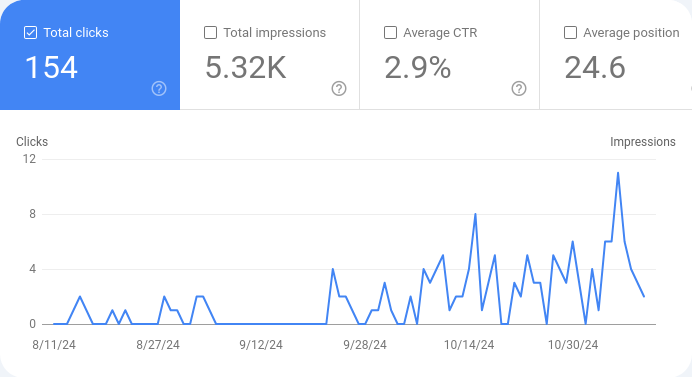How to triple* Google search traffic with one wording change

Introduction
In August 2024, Pyrfecter.com reached 20 clicks from Google Search in 28 days for the first time. Three months later, the site is just a click away from reaching 120 clicks in 28 days.
Granted, this isn't colossal organic search traffic, but it is a pretty big jump considering that almost all of the new traffic can be attributed to one wording change on one page on October 9th.
The steps
Step 1: have good content
This might not need to be said, but if your site doesn't provide something people are searching for, no amount of SEO can save you.
Step 2: research queries
To optimize for specific queries, you need to know what they are.
"Thanks, Captain Obvious."
Fair, fair. But how can you find out what keywords to optimize for?
- look at the search terms that are already surfacing your content using tools like Google Search Console and Bing Webmaster Tools
- NB: if your site is very new, the data here will be limited
- do research using a tool like Semrush to see which keywords competing sites are ranking for
- compare keyword popularity using Google Trends
Here are the queries where a Pyfecter page appeared in the Google results for the 3 months ending November 11, 2024 (from Google Search Console):
| Top queries | Impressions |
|---|---|
| python linter | 553 |
| python linter online | 532 |
| linting python | 418 |
| python lint online | 371 |
| python linting | 363 |
| walrus operator python | 279 |
| python walrus operator | 254 |
| walrus operator | 203 |
| what is a python linter | 195 |
| linting in python | 194 |
And here are the Google Trends over the past 5 years for "python linter" and "lint python", showing that "python linter" consistently trends higher:

Step 3: incorporate those queries in your page
Now that you know what language people use to find content like yours, it's time to update your page to use that language. And—I can't stress this enough—it needs to feel natural.
If your page's content reads as though it's cramming in as many keywords as it can, your page may get punished for keyword stuffing:
Keyword stuffing refers to the practice of filling a web page with keywords or numbers in an attempt to manipulate rankings in Google Search results.
- Google Search Central, Spam policies for Google web search
With keywords, a little goes a long way.
Below is the Markdown source code for https://pyrfecter.com/lint/, which is built using my static site generator Blurry.
You'll notice three changes in the diff (red lines were removed; green lines were added):
nameTOML front matter, which is used as the page's<title>, updated with the new wording- a newer
datePublished, which is included in the site's sitemap to tell search engines that the page has changed - the page's top-level heading updated with the new wording (
#in Markdown is an<h1>in HTML)
--- a/content/lint.md
+++ b/content/lint.md
@@ -1,12 +1,12 @@
+++
"@type" = "WebPage"
-name = "Lint Python code securely in your browser with Pyrfecter"
+name = "Pyrfecter: the secure online Python linter"
abstract = "With Pyrfecter, you can lint Python code quickly and securely right in your browser. Plus, it's 100% free."
-datePublished = 2024-05-11
+datePublished = 2024-10-09
_show_code = true
+++
-# Lint Python online with Pyrfecter
+# Pyrfecter: the secure online Python linter
That three-line diff is the whole git commit that kicked off a steady increase in organic search traffic.
Step 4: tell search engines
Before you can see real-world results from your SEO changes, you'll need to tell search engines that your content has changed and ask them to index the updated pages.
For Google, open Google Cearch Console and navigate to Google's URL Inspection tool to request indexing for the URL.
The process is similar for Bing: input your updated URL in the Bing Webmaster Tools URL Submission tool.
Step 5: watch the numbers go up
It can take a couple of days before changes in search performance start to happen, so this step requires a bit of patience.
But, if your SEO work was a success, you'll soon be able to watch your organic search traffic go up and to the right:

Wrap-up
For search marketers and plenty of developers, the information in this post may be old hat.
As someone who has been learning about and experimenting with SEO for 15 years, though, I'm still surprised at what an impact even one small change can have on search performance.
Granted, when a site doesn't get much organic search traffic, it's much easier to see large percentage improvements. But I think this point stands on its own: using the same language as your site's prospective visitors is fundamental to SEO and can get you measureable results.